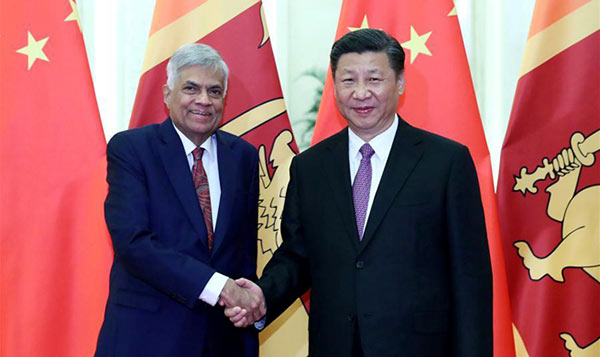Sri Lanka PM courts increased infrastructure investment from China: Xinhua

Sri Lankan Prime Minister Ranil Wickremesinghe told Chinese President Xi Jinping on Tuesday that he welcomed increased Chinese investment in Sri Lanka’s major infrastructure projects, Chinese state media said.
China signed a deal with Sri Lanka late last year to further develop the strategic port of Hambantota and build a huge industrial zone nearby, a key part of Xi’s signature economic and foreign policy to create a modern-day “Silk Road” across Asia, Europe and Africa.
But amid concern over increasing Chinese investment, hundreds of Sri Lankans clashed with police at the industrial zone’s opening in January.
Meeting Xi in Beijing after attending China’s Belt and Road Forum on Sunday and Monday, Wickremesinghe said Sri Lanka was willing to work with China to “successfully push forward” the Hambantota and Colombo Port City projects, according to official Chinese news agency Xinhua.
Xi said the construction of a China-Sri Lanka free trade zone would prove a key starting point in promoting fair and sustainable development in bilateral trade, accelerate ease of investment and realise the unimpeded flow of trade and capital.
Major projects with Sri Lanka should act as precursors for driving infrastructure connectivity and maritime and aviation cooperation, Xi added, according to Xinhua’s report.
Sri Lanka aims to finalise a free trade agreement with China this year, their 65th anniversary year of trade relations.
(Reuters)

Latest Headlines in Sri Lanka
- Court of Appeal to rule on IGP Tennakoon’s arrest warrant on March 17, 2025 March 12, 2025
- Military deserter arrested for sexually assaulting doctor at Anuradhapura Hospital March 12, 2025
- Tuition teacher under investigation for student assault ignores NCPA summons March 12, 2025
- Sri Lanka maintains stance on Adani, open to investment March 12, 2025
- Doctors strike over delay in arrest of sexual assault suspect March 12, 2025



Two years into President Maithripala Sirisena’s term, Sri Lanka’s fragile hopes for lasting peace and cooperation across party and ethnic lines are imperiled.
I urge President Maithripala Sirisena to come good on his promise to deliver justice for tens of thousands of war victims or risk renewed conflict.
Despite significant achievements in the coalition government’s first nine months, progress on most of its reform agenda has slowed to a crawl or been reversed. As social tensions rise and the coalition slowly fractures, it is unclear whether it can push its signature new constitution through parliament and to a national referendum. Neither the president nor prime minister has made a serious attempt to win support for a more inclusive polity or to reform the national security state to tackle the institutionalised impunity that has fed ethnic unrest and harmed all communities. To protect democratic gains, enable lasting reforms and reduce risks of social and political conflict, the “unity government” should put aside short-term party and individual political calculations and return to a politics of reform and openness.
Ambitious promises to improve the economy, eliminate corruption, restore rule of law, address the legacy of war and write a new constitution remain largely unrealised. As the government struggles with large budget deficits and dangerously high debt, hopes for improved living standards have been frustrated, further eroding trust in it and strengthening the appeal of the Rajapaksa-led opposition.
Sirisena is locked in a battle with Rajapaksa for control of their Sri Lankan Freedom Party (SLFP) and hemmed in by the party’s traditional nationalism. SLFP ministers were never enthusiastic about being the junior partner in a unity government with their long-time rival, the United National Party (UNP), and are unhappy with what many see as UNP arrogance and Prime Minister Ranil Wickremesinghe’s less-than-consultative style.
Afraid of being outflanked by Rajapaksa’s nationalism, the Sirisena SLFP wing resists key governance and reconciliation promises, even as this weakens support from constituencies that brought Sirisena to power: Tamils, Muslims and Sinhalese dismayed by corruption, abuse of power and high cost of living under Rajapaksa.